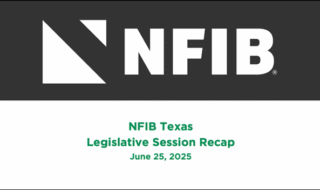January 20, 2021
Seven State Government Policy Priorities and Trends Across the Country
With the new year underway, NFIB is focused on policy progress at the state and federal levels of government. NFIB is actively working on dozens of issues, and here’s a look at 7 of our priorities trending in state capitols across the nation.
“States can and must take a leading role in helping small business recover from the disasters of 2020,” said Tim Goodrich, Executive Director of NFIB State Government Relation. “State leaders can either empower small businesses to rebuild their communities and the economy, or they can kick job creators when they’re already down. We’ll fight tirelessly to ensure state policymakers make the right choice.”
Here’s a look at 7 state government policy priorities.
1: Liability Protections
Small businesses urgently need a legal shield from trial lawyers looking to profit off the pandemic. Small businesses may face a future of frivolous lawsuits that will bankrupt and cripple them while slowing each state’s economic recovery. With liability protections, small businesses will have the confidence to reopen their doors and rebuild their communities.
NFIB has engaged on this issue in every state. More than a dozen states have already enacted liability shields, including Georgia, Idaho, Iowa, Kansas, Louisiana, Mississippi, Nevada, North Carolina, Ohio, Oklahoma, Tennessee, Utah, and Wyoming. Kentucky, Florida and other states have proposed legislation, while North Dakota, Missouri, Indiana, and Montana are moving forward with common-sense mmeasures.
Brad Jones, NFIB’s Missouri State Director, has described why liability protections matter so much: “Our small business owners and job creators need peace of mind as they get back to work and get back to doing what they do best: keeping Missouri’s economy running.” The same is true for small businesses in every state.
2: SALT Deduction
The 2017 Tax Cuts and Jobs Act provided historic relief for small businesses, especially through its 20% business income deduction, which NFIB strongly supported. At the same time, the law repealed the federal State and Local Tax (SALT) Deduction, hurting small businesses in high-tax states in particular.
Fortunately, last November, the IRS approved a workaround to restore some tax relief. Now NFIB is pushing to enact that workaround on a state-by-state basis, in the form of a tax credit against S-Corp income. Connecticut, Louisiana, New Jersey, Oklahoma, Rhode Island, and Wisconsin have already enacted this policy, while California has announced its intention to follow suit. NFIB is fighting for action in other states, too.
NFIB’s Illinois State Director, Mark Grant, explained what’s at stake: “States like Illinois have a terrible tax burden that holds small businesses back. While some policymakers want to raise taxes further, the better path is to restore some of the relief from the old federal SALT deduction. Such a move will strengthen small businesses – especially coming out of the pandemic and economic shutdowns.”
3: Workplace Regulations
In response to the pandemic, many states issued one-size-fits-all workplace regulations that have placed a huge burden on small business. These mandates take many forms and typically hit the smallest businesses the hardest, making it much more difficult to keep their doors open. Whatever form they take, NFIB is fighting to roll back these burdens.
NFIB is taking every available avenue. In California, the NFIB Small Business Legal Center is suing the state for breaking the law when issuing its workplace regulations. In Virginia, NFIB is urging the Governor and the state Department of Labor to rethink their harmful regulations instead of simply re-issuing them.
John Kabateck, NFIB’s California State Director, expressed the frustration that small businesses are feeling: “When the Legislature is not heaping more new laws on the soon-to-be-broken backs of businesses, its entrenched bureaucracy can’t resist adding its own burdens. Now is the time to end the regulatory nonsense and restore regulatory common-sense, before it’s too late for small businesses.”
4: Tax Increases
Many states are facing budget shortfalls in the wake of the pandemic and the shutdowns that devastated economic activity. Yet rather than generate revenue by unleashing economic growth and job creation, states like New York are threatening to raise taxes on small businesses.
NFIB opposes these tax increases across the board. Specific proposals are still being worked out in many cases, such as New York, where Governor Cuomo has said tax hikes have to be considered without sufficient federal aid. Regardless, NFIB’s message to policymakers is simple: Raising taxes on small business will hold states back at the exact time they should be trying to move forward.
“As many states – including New York – confront historic budget deficits and fiscal turmoil, states must not look to struggling small businesses as a newfound source of untapped revenue,” said Greg Biryla, New York State Director for NFIB. “While the states’ fiscal distress is real, it’s nothing compared to the distress small businesses have shouldered day-in and day-out since March. Now is the absolute worst time to saddle Main Street with new taxes.”
5: Paid Leave
States and cities across America have instituted new paid leave policies over the past year. At a time when revenue is falling, these mandates raise costs and make it harder for small businesses to operate and grow.
The damage is especially serious in states like Texas where different cities have created a patchwork of paid leave policies. Small businesses don’t have the legal teams or resources to keep up with this fast-changing mandate landscape.
Annie Spilman, NFIB’s Texas State Director, described the stakes with paid leave mandates: “Small businesses know how to take care of their employees and communities. They don’t need top-down paid leave mandates, which typically do more harm than good. Now is the time to lower the burdens on small business, not raise them to the breaking point.”
6: Unemployment Insurance
State unemployment insurance trust funds have taken major hits over the past year. While restoring those funds is important, it must be done in the right way.
Nearly 20 states have followed NFIB’s request to refill unemployment coffers using federal funding from the CARES Act. NFIB is now pushing other states to enact legislation that will protect small businesses from steep tax increases. Such tax hikes are unaffordable for small businesses still dealing with the damage of the past year.
NFIB Massachusetts State Director Chris Carlozzi described his state’s situation, which mirrors the reality in other states: “If small businesses in Massachusetts are expected to retain and create jobs to assist with the state’s recovery, lawmakers must take action to prevent a nearly 60% hike in unemployment insurance taxes. The longer it takes the Legislature to address this crisis, the slower the recovery will be.”
7: Business Costs
State lawmakers are considering a variety of measures that would make running a small business less affordable and more painful. From minimum wage hikes to daily fines for lockdown violations to penalties for laying off employees, these policies are guaranteed to backfire and force small businesses to reconsider their futures.
NFIB is fighting to stop or repeal these policies on every front. In Illinois, NFIB helped defeat a rule that would have leveled criminal penalties on small businesses that don’t uphold the state’s stay-at-home order. In Washington, NFIB is working to eliminate costly fines, new regulations, and new penalties for employers.
“Rather than threaten the very survival of even more small businesses with added restrictions, higher taxes, and unnecessary penalties, state regulators and lawmakers should focus on how to help them recover from this pandemic,” said Patrick Connor, NFIB’s Washington state director. “Let Main Street re-open safely, put people back to work, and provide our communities the products and services they need to thrive once again.”
var acc = document.getElementsByClassName(“accordion”); var i; for (i = 0; i < acc.length; i++) { acc[i].onclick = function() { this.classList.toggle("active"); var panel = this.parentElement.nextElementSibling; if (panel.style.maxHeight) { panel.style.maxHeight = null; } else { panel.style.maxHeight = panel.scrollHeight + "px"; } } }
NFIB is a member-driven organization advocating on behalf of small and independent businesses nationwide.
Related Articles














